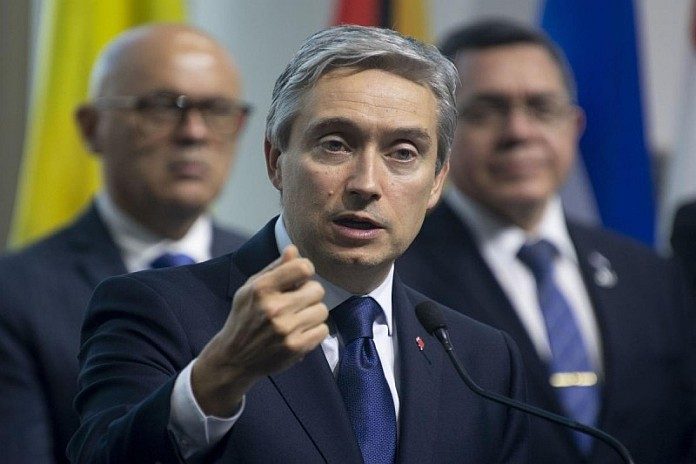By Arnold August
For the first time since Juan Guaidó’s proclamation as interim president of Venezuela in January 2019, a meeting of the Lima Group has failed to even mention his name.
All previous meetings of this spurious organization served as pledges to bring Guaidó to power and seemed to constitute virtual swearing-in ceremonies. However, Guaidó has never come close to being sworn in; except by himself. On February 20, despite the extremely cold weather (even by Canadian standards), people demonstrated across Canada, including in front of the venue for the latest Lima Group meeting in Gatineau, Québec. At the same time, a statement by the Canadian federal government in English, French, and Spanish was widely distributed to the public and the media from coast to coast.
The message and slogans focused on the Trudeau government’s role as a US proxy in the Trump-led aggression against the legitimately elected president of Venezuela, Nicolás Maduro.
This constitutes an important lesson for progressive Canadians who have refused to give an inch to international pressure to convert anti-imperialist sentiment into consent for the Trudeau government’s actions in Venezuela.
On the contrary, following the Lima Group’s omission of Guaidó during its recent meeting in Gatineau, Canadians who understand the situation must seize the opportunity to inform the public and demand that Canada withdraw from the multilateral body that is largely made up of reactionary leaders from across the hemisphere.
In addition, as highlighted in the message being sent by demonstrators, there is a desire to step up criticism of the Trudeau government for its domestic policies, such as those currently being implemented against Indigenous peoples in northwestern British Columbia, which are in flagrant contradiction to the Lima Group’s lofty principals of “democracy” and “human rights” which it uses to chastise the Venezuelan leadership.
The Gatineau event was the first Lima Group meeting since the recent four-month anniversary of the uprising in Chile, the violent coup in Bolivia, ongoing demonstrations in Haiti, and massive protests in Colombia, all of which were met with thousands of arrests and plenty of bloodshed. Yet, the representatives of Chile, Haiti, Colombia, and Bolivia, presided over by Trump’s main ally, Trudeau, were all present in Gatineau on February 20.
The focus of the meeting once again centred on supporting a “democratic transition” in Venezuela while supporting further sanctions to put additional pressure on the Maduro regime. The aforementioned declaration released by the Government of Canada states:
While the Venezuelan Constitution calls for parliamentary elections in 2020, democracy will be fully restored in Venezuela only through free, fair and credible presidential elections. This process must include an independent National Electoral Council, an un-biased Supreme Court, international support and observation, full press freedom and political participation of all Venezuelans.
This interventionist statement amounts to preparing the conditions for calling the elections a “fraud,” as no self-respecting country in the world would allow its electoral process to be decided upon in a foreign nation. To illustrate once again the self-serving nature of this statement, on the very day the declaration was issued, the US-backed Bolivian government, installed by a coup d’état, ruled against Evo Morales running for the Senate in that country’s upcoming elections.
Trudeau was rewarded by the Lima Group members with a special made-to-measure clause for him to “lead” on Venezuela, as part of his global search for a seat on the UN Security Council. The clause reads as follows:
In the coming days and weeks, representatives of the Lima Group will engage in an intensive period of outreach and consultation with all countries that have an interest in the restoration of democracy in Venezuela.
Thus, Trudeau is being mandated once again to do Trump’s dirty work, opportunistically using his advantage over the other Lima Group members to directly reach out to Europe, the Caribbean and elsewhere, hoping to steal the international spotlight and gain votes at the UN for the Security Council seat Canada covets.
Yet, Canada does not deserve a seat on the Security Council. No country that is a faithful ally of the US on all international issues, and that has been severely criticized by UN bodies for its ongoing genocidal treatment of its Indigenous peoples, should get a seat at that table.
The international community must not forget the Trudeau government’s recent actions in Latin America, the current thrust of which is fixated on upending the Maduro government. Crucially, this has been supported by the recent coup d’état against Bolivia’s elected president—a move that Canada tacitly supported—which enabled that country to join the Lima Group. Under its deposed former leader Evo Morales, that would never have been possible.
This article written by Arnold August, originally appeared on Canadian Dimension on February 23, 2020.
Arnold August is a Canadian journalist and lecturer, the author of Democracy in Cuba and the 1997–98 Elections, Cuba and Its Neighbours: Democracy in Motion and Cuba–U.S. Relations: Obama and Beyond. He collaborates with many web sites, television and radio broadcasts based in Latin America, Europe, North America and the Middle East. Follow him on Twitter and Facebook.





